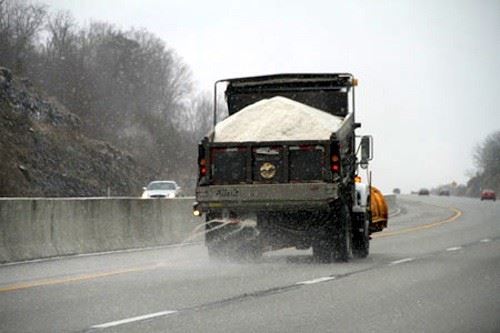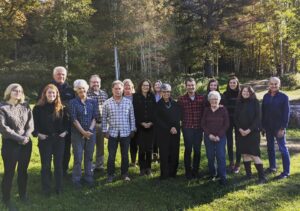A new study, which state officials say they are reviewing, shows that drinking water wells in the path of runoff from state roads in the Adirondack Park tend to have high levels of salt.
The potential culprit? Road salt.
The study, conducted by Paul Smith’s College Adirondack Watershed Institute, sampled nearly 400 private wells across the park. Some wells sampled received no runoff, some received local road runoff and others received state road runoff.
Of those that received state road runoff, more than half had chloride levels higher than 20 milligrams per liter, and a quarter of those wells had levels exceeding 250 milligrams per liter. That’s compared to about 10 percent of wells that receive runoff from local roads, which detected levels higher than 20 milligrams per liter. No wells receiving local road runoff exceeded 250 milligrams per liter.
Of the approximately 400 sampled, 55 were in Saratoga, Warren and Washington counties, with the majority in Warren County. None of the wells in those counties exceeded any chloride guidelines.
Chloride is not on the U.S. Environmental Protection Agency’s list of drinking water contaminants that pose a risk to human health and thus is not federally regulated. It is, however, on a list of secondary standards that may affect water’s taste, odor and appearance. It also may affect the technical functioning of equipment. In this instance, federal guidelines show that 250 milligrams per liter of chloride or more makes water taste salty.
The state Department of Health said there are other guidelines for those on low sodium diets or moderately restricted sodium diets. For example, those on low sodium diets should not drink water that exceeds 20 milligrams per liter. The state also utilizes the EPA’s saltiness guideline.
Still, too much salt in diets has shown to increase risk of heart disease and strokes. Some people are also seeing corroded pipes and plumbing fixtures due to salt, according to a release.
AdkAction, a nonprofit organization representing different issues in the Adirondacks, thinks the state needs to do more in reducing its use of road salt. The state Department of Transportation announced last month a pilot study for some state roads around Lake George and Mirror Lake, where road salt-reducing initiatives will be used while still keeping motorists safe.
“While we appreciate being invited to participate in the strategic working group and acknowledge that the pilots in Lake George and Lake Placid are a step in the right direction, we must insist that the state take a stronger stance to protect Adirondack waters,” said AdkAction Executive Director Brittany Christensen in a release. “Based on the study, more than half of private wells located along state roads are likely contaminated with road salt, and we want the state to reexamine its entire winter road maintenance protocol and use the entire Adirondack Park as a pilot area for statewide reduction.”
Joe Morrissey, spokesperson for DOT, said the agency appreciates the partnership with AdkAction and other organizations to maintain the beauty and character of the park.
“They have contacted the State with their data, and the State is in the process of reviewing and further analyzing the study,” he added in a statement. “We are happy to partner with them to conduct pilot projects to investigate the feasibility of reducing salt application rates, while continuing to meet our legal duty to provide for the safety of the traveling public.”
Lake George Waterkeeper Chris Navitsky, who also worked on the study, said he believes the state’s recently announced pilot study is a step in the right direction, though he feels more could be done. Both The Fund for Lake George and the Lake George Association have worked on road salt reduction programs, as have various municipalities and other stakeholder groups.
“We felt the state should look at that (study) and not be as cautious as they are,” Navitsky said. “We feel that we can maintain road safety, which is the most important way with this, but we can do it in ways where you can reduce the amount of road salt. And we understand that they’re cautious, of course, but clearly there’s evidence that shows we can be successful.”
Reporter Gwendolyn Craig can be reached at (518) 742-3238 or [email protected]. Follow her on Twitter @gwendolynnn1.





